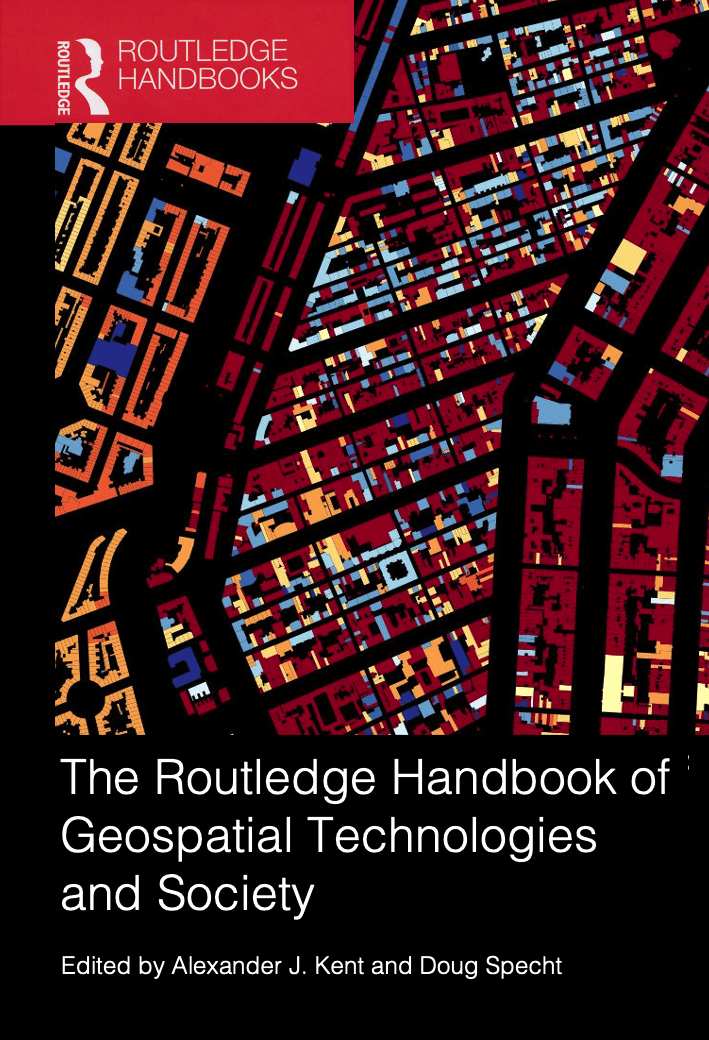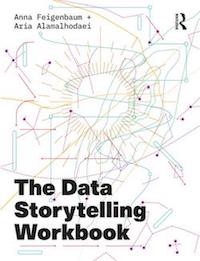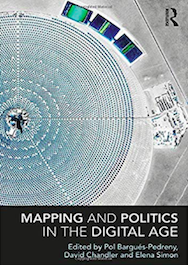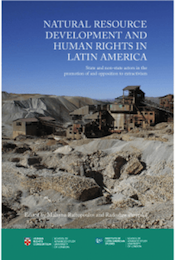2023

Geospatial Technologies in Archaeology
Kent, Alexander J.; Specht, DougBook Chapter
In: The Routledge Handbook of Geospatial Technologies and Society, Chapter 41, Routledge, 2023, ISBN: 9780367428877.
@inbook{nokey,
title = {Geospatial Technologies in Archaeology},
author = {Alexander J. Kent and Doug Specht},
url = {https://www.routledge.com/The-Routledge-Handbook-of-Geospatial-Technologies-and-Society/Kent-Specht/p/book/9780367428877},
isbn = {9780367428877},
year = {2023},
date = {2023-08-17},
urldate = {2023-08-17},
booktitle = {The Routledge Handbook of Geospatial Technologies and Society},
publisher = {Routledge},
chapter = {41},
keywords = {},
pubstate = {published},
tppubtype = {inbook}
}

Geospatial Technology and the Sustainable Development Goals (SDGs)
Specht, DougBook Chapter
In: The Routledge Handbook of Geospatial Technologies and Society, Chapter 39, Routledge, 2023, ISBN: 9780367428877.
@inbook{nokey,
title = {Geospatial Technology and the Sustainable Development Goals (SDGs)},
author = {Doug Specht},
url = {https://www.routledge.com/The-Routledge-Handbook-of-Geospatial-Technologies-and-Society/Kent-Specht/p/book/9780367428877},
isbn = {9780367428877},
year = {2023},
date = {2023-08-17},
urldate = {2023-08-17},
booktitle = {The Routledge Handbook of Geospatial Technologies and Society},
publisher = {Routledge},
chapter = {39},
keywords = {},
pubstate = {published},
tppubtype = {inbook}
}
2022

Environmental Movements and Digital Media
Kavada, Anastasia; Specht, DougBook Chapter
In: Grasso, Maria; Giugni, Marco (Ed.): Chapter 35, Routledge, The Routledge Handbook of Environmental Movements, 2022, ISBN: 9780367855680.
@inbook{nokey,
title = {Environmental Movements and Digital Media},
author = {Anastasia Kavada and Doug Specht},
editor = {Maria Grasso and Marco Giugni},
url = {https://www.routledge.com/The-Routledge-Handbook-of-Environmental-Movements/Grasso-Giugni/p/book/9780367428785
https://www.taylorfrancis.com/chapters/edit/10.4324/9780367855680-41/environmental-movements-digital-media-anastasia-kavada-doug-specht},
isbn = {9780367855680},
year = {2022},
date = {2022-01-25},
urldate = {2022-01-25},
publisher = {Routledge},
edition = {The Routledge Handbook of Environmental Movements},
chapter = {35},
abstract = {In the face of ecological meltdown, environmental movements have regularly turned to digital media to champion their cause, draw in new supporters, and bring public attention to environmental harms and injustices. This chapter explores how environmental movements employ a wide range of digital tools to organize their activities, coordinate their members, and raise awareness through visual storytelling and digital mapping. From Instagram to hashtags, from livestreaming to digital maps, these tools help shape narratives and allow movements to connect with each other across boundaries and issues. Through the exploration of numerous examples, such as #FridaysForFuture and Extinction Rebellion, this chapter provides an overview of how digital tools can transform, and already have transformed the work of environmental movements.},
keywords = {},
pubstate = {published},
tppubtype = {inbook}
}
2021

The self(ie) in the Anthropocene
Specht, Doug; Snyder, CatBook Chapter
In: Harper, Earl T.; Specht, Doug (Ed.): Chapter 9, Routledge, Imagining Apocalyptic Politics in the Anthropocene, 2021, ISBN: 9781003128854.
@inbook{nokey,
title = {The self(ie) in the Anthropocene},
author = {Doug Specht and Cat Snyder},
editor = {Earl T. Harper and Doug Specht},
url = {https://www.taylorfrancis.com/chapters/edit/10.4324/9781003128854-10/self-ie-anthropocene-doug-specht-cat-snyder
https://www.taylorfrancis.com/books/edit/10.4324/9781003128854/imagining-apocalyptic-politics-anthropocene-earl-harper-doug-specht
},
isbn = {9781003128854},
year = {2021},
date = {2021-09-29},
urldate = {2021-09-29},
publisher = {Routledge},
edition = {Imagining Apocalyptic Politics in the Anthropocene},
chapter = {9},
abstract = {Selfies provide proof of an event witnessed through combining a presentation of self along with the event. They also demonstrate interest and support of a movement, but moreover the selfie reaffirms the existence of the protester as they wrestle with their own minimisation in the face of global climate breakdown. The taker of the selfie is reaffirmed through their existence both as an embodied presence before the lens, and as a digital image distributed across social networks. This chapter seeks to explore the role of the selfie in creating new political and social spaces, and in reaffirming the existence of the individual in the Anthropocene. Using content analysis of Twitter from XR actions in 2019, this chapter asks whether such activities are really the death of the public sphere and potentially self-defeating, or whether they are important place-making actions that challenge subjugation.},
keywords = {},
pubstate = {published},
tppubtype = {inbook}
}

Specht, DougBook Chapter
In: Badenoch, Kirsty; Skandarajah, Sayan (Ed.): Chapter 4, pp. 90-94, Cartographies of the Imagination, 2021.
@inbook{nokey,
title = {Cézanne the Cartographer},
author = {Doug Specht},
editor = {Kirsty Badenoch and Sayan Skandarajah},
url = {https://cartographiesoftheimagination.com/
https://camri.ac.uk/blog/2021/07/10/writing-drawing-and-discussion-doug-specht-on-cezanne-as-cartographer},
year = {2021},
date = {2021-07-10},
urldate = {2021-07-10},
pages = {90-94},
edition = {Cartographies of the Imagination},
chapter = {4},
keywords = {},
pubstate = {published},
tppubtype = {inbook}
}
2020

‘The Cartographic Gaze’; ‘Contested Coordinates’; ‘The Problem of Map Representations’
Specht, DougBook Chapter
In: Feigenbaum, Anna; Alamalhodaei, Aria (Ed.): Routledge, The Data Storytelling Workbook, 2020, ISBN: 9781138052116.
@inbook{nokey,
title = {‘The Cartographic Gaze’; ‘Contested Coordinates’; ‘The Problem of Map Representations’},
author = {Doug Specht},
editor = {Anna Feigenbaum and Aria Alamalhodaei},
url = {https://www.routledge.com/The-Data-Storytelling-Workbook/Feigenbaum-Alamalhodaei/p/book/9781138052116},
isbn = {9781138052116},
year = {2020},
date = {2020-03-06},
urldate = {2020-03-06},
publisher = {Routledge},
edition = {The Data Storytelling Workbook},
abstract = {From tracking down information to symbolising human experiences, this book is your guide to telling more effective, empathetic and evidence-based data stories.
Drawing on cross-disciplinary research and first-hand accounts of projects ranging from public health to housing justice, The Data Storytelling Workbook introduces key concepts, challenges and problem-solving strategies in the emerging field of data storytelling. Filled with practical exercises and activities, the workbook offers interactive training materials that can be used for teaching and professional development. By approaching both ‘data’ and ‘storytelling’ in a broad sense, the book combines theory and practice around real-world data storytelling scenarios, offering critical reflection alongside practical and creative solutions to challenges in the data storytelling process, from tracking down hard to find information, to the ethics of visualising difficult subjects like death and human rights.},
howpublished = {Small sections},
keywords = {},
pubstate = {published},
tppubtype = {inbook}
}
Drawing on cross-disciplinary research and first-hand accounts of projects ranging from public health to housing justice, The Data Storytelling Workbook introduces key concepts, challenges and problem-solving strategies in the emerging field of data storytelling. Filled with practical exercises and activities, the workbook offers interactive training materials that can be used for teaching and professional development. By approaching both ‘data’ and ‘storytelling’ in a broad sense, the book combines theory and practice around real-world data storytelling scenarios, offering critical reflection alongside practical and creative solutions to challenges in the data storytelling process, from tracking down hard to find information, to the ethics of visualising difficult subjects like death and human rights.
2018

From the Cartographic Gaze to Contestatory Cartographies
Specht, Doug; Feigenbaum, AnnaBook Chapter
In: David Chandler Pol Bargués-Pedreny, Elena Simon (Ed.): Routledge, Mapping and Politics in the Digital Age, 2018, ISBN: 9781351124485.
@inbook{nokey,
title = {From the Cartographic Gaze to Contestatory Cartographies},
author = { Doug Specht and Anna Feigenbaum},
editor = {Pol Bargués-Pedreny, David Chandler, Elena Simon},
url = {https://www.taylorfrancis.com/books/edit/10.4324/9781351124485/mapping-politics-digital-age-pol-bargu%C3%A9s-pedreny-david-chandler-elena-simon},
doi = {https://doi.org/10.4324/9781351124485},
isbn = {9781351124485},
year = {2018},
date = {2018-11-12},
urldate = {2018-11-12},
publisher = {Routledge},
edition = {Mapping and Politics in the Digital Age},
abstract = {Rene Descartes declared in the sixteenth century that the world was now dominated by the visual, a notion that would be seen as defining the Enlightenment. As the increased dominance of seeing and the desire to visualise the world cohered with the production of increasingly accurate tools of measurement and the advent of the printing press, cartography emerged as a discipline, often used as tool of oppression and dominance. Cartographic visualisations afforded the creator, and user, a God’s eye view of the world. Following others, this chapter refers to this way of seeing the world from above as the ‘cartographic gaze’. First, the chapter briefly examines the historical emergence of the cartographic gaze before turning to a discussion about how the proliferation of geographic imaging technologies and digital tools simultaneously further embedded this gaze into mapping practice, while also diffusing such practices of mapping to broader populations. Discussing the rise of participatory mapping and counter-mapping under the rubric of contestatory cartographies, the chapter presents some of the challenges that face those attempting to create alternative maps of their worlds and the ways in which they become entrapped by the pervasiveness of the cartographic gaze. We use the term participatory mapping to refer to methodologies for map-making based around the participation of those who the map will represent. And we employ the term counter-mapping to reference those mapping practices that explicitly seek to expose and challenge power relations. In particular, we look at how the colonising origins of the ‘cartographic gaze’ limit what it is possible to do with these alternative mapping practices.},
keywords = {},
pubstate = {published},
tppubtype = {inbook}
}
2017

Neogeography, development and human rights in Latin America
Specht, DougBook ChapterOpen Access
In: Raftopoulos, Malayna; Powęska, Radosław (Ed.): Chapter 5, University of London Press, Natural Resource Development and Human Rights in Latin America, 2017, ISBN: 978-1-912250-01-1.
@inbook{nokey,
title = { Neogeography, development and human rights in Latin America},
author = {Doug Specht},
editor = {Malayna Raftopoulos and Radosław Powęska},
url = {https://www.sas.ac.uk/publications/natural-resource-development-and-human-rights-latin-america},
isbn = {978-1-912250-01-1},
year = {2017},
date = {2017-12-31},
urldate = {2017-12-31},
publisher = {University of London Press},
edition = {Natural Resource Development and Human Rights in Latin America},
chapter = {5},
abstract = {Latin America has a long history of exploitation and oppression of populations, moreover it has been suggested that the ‘postcolonial’ quest for rapid national `modernization’ has led to an increase in the extractive, neoliberal, policies of corporations and governments working across the region (Bryant, 1998: 85). Rarely, however, has this been taken lying down. Social movements and activist groups are active all across the region, fighting for human rights, land rights, environmental rights, indigenous rights and many more in the face of corporate and government oppression. This strong history of activist movements and the continuing exploitation of the region makes Latin America a suitable location to explore the way knowledge is created and passed-on, with a view to promoting Social Movement Organisations fighting for Development with a focus on Human Rights. Couple this with challenging geographies and a rapid uptake rates of mobile and digital technologies and the region also presents itself a prime location to explore the inter-relation between those movements, spatial knowledges and the use of Geographic Information Systems.},
keywords = {},
pubstate = {published},
tppubtype = {inbook}
}
